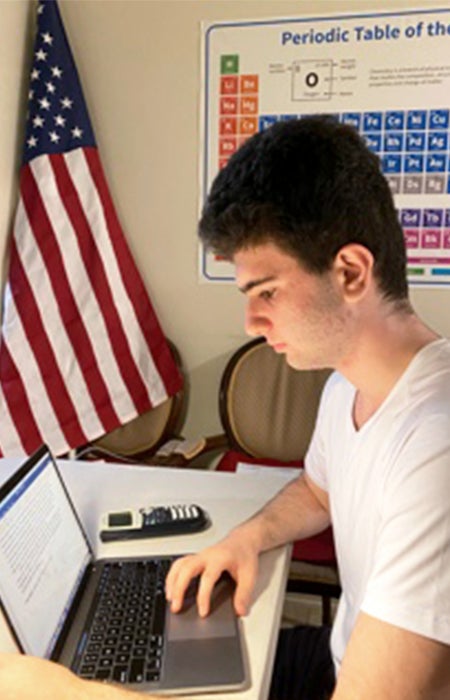
“Succeed to serve”: New student group grounds learning in altruism
Richard Petrosyan wants to bring back the art of debate.
Not the shouting matches that dominate the news, or the bouts of evasion and name-calling that characterize nearly every political debate in the United States.
No, Petrosyan envisions the return of real debates that abide by strict rules and prompt introspection. Ones that leave the audience — and the participants — with something to think about.
Providing a space for the free exploration and expression of ideas based on research is one of the main reasons Petrosyan, a junior pursuing a bachelor’s degree in neuroscience with a minor in health care studies at USC Dornsife College of Letters, Arts and Sciences, founded the Philologos Society in 2019.
The society aims to provide, through debates, research papers, guest speakers and other avenues, a place where the intellectually curious can roam. They then use the knowledge gained to fulfill the second component of the society — public service, which in this case takes the form of volunteer work among high school students and senior citizens.
“What I wanted to do was organize a series of activities where people could do research, give presentations and debate ideas, and then synthesize that knowledge and intellectual growth and put it in the service of the community,” said Petrosyan, who also serves as the society’s president.
The club, which currently numbers 45 students, is open to all undergraduates at USC.
Unconventional arguments welcome

Each year, the Philologos Society hosts several activities, such as guest speaker presentations and symposia, which cover topics ranging from mental illness to ancient Roman hairstyles. The society’s website also has an online publication section that is home to members’ creative and research-oriented works, including articles on sustainable fashion, surgical robotics and archaeological ethics.
“I founded the society because I did not find a space at the university where you could freely speak about a variety of things, whether they were philosophical questions, new topics, or the formulation of opinions or arguments,” Petrosyan said.
One of the areas in which members can practice said free speech is the debate arena. The society hosts six debates each year, with each structured in a different format, such as parliamentary or Paris style.
Petrosyan stressed that debate arguments can take unconventional, even unpopular, positions, but they must be founded on research and critical thinking, not opinion or emotion.
“One of the cornerstones of the society is freedom of speech. We want you to be able to argue for both sides, even if it’s politically incorrect, even if most people around you disagree with that standpoint. The idea is to promote tolerance of discourse, and that’s something unfortunately I don’t really see anywhere, whether at USC or anywhere else in society,” Petrosyan said.
Altruism beyond the school walls
For the Philologos Society, debates are not just an intramural affair. One of its more popular volunteer activities involves teaching the art of debate to students at two community schools: USC Hybrid High College Prep and William Jefferson Clinton Middle School. The society has partnered with the Los Angeles Metropolitan Debate League to allow USC philologians to receive training in how to judge debates, which they then use to organize and oversee debates among the high school students.
In addition to debate coaching, the society also gives classroom presentations on different topics to the students at the two schools, said society Vice President Sean Silvia, a junior with a history and archaeology double major with a minor in classics.
“With the high school presentations, it’s really cool to see how the students respond, how many kids get excited about things like archaeology that they aren’t normally taught in the classroom,” he said.
In addition to training future generations, the society aims to connect with older ones. It recently partnered with Meals on Wheels West in Santa Monica, California, to provide meal delivery to house-bound senior citizens. Philologians have also signed on to the organization’s “phone reassurance” program, in which delivery volunteers phone up some of the clients on their route to have a chat.
Petrosyan said that such services not only benefit the recipients, they also can help Philologians develop a sense of empathy and selflessness, important things for young people who have likely not faced extreme hardship. He experienced this himself while talking to a man on his route who had survived the Holocaust. The man gave him a book by a fellow prisoner that detailed how he and his mother had to share a small piece of bread as their daily allotment of food.
“I read that book and it was interesting because so many details are left out of history classes and books for the sake of brevity. These things hopefully shape people’s thinking to maybe be less egotistical, less individualistic, and to appreciate every single possession, whether that’s money or food,” he said.
Silvia added that such connection to seniors is especially meaningful when many face extreme isolation brought on by the pandemic.
“All of the people I spoke with had their lives upturned by the pandemic, and I could tell that even a nice conversation made a large difference to them,” he said. “I came away feeling satisfied because in such a dark year as this, being a force for good can be an antidote to despair.”